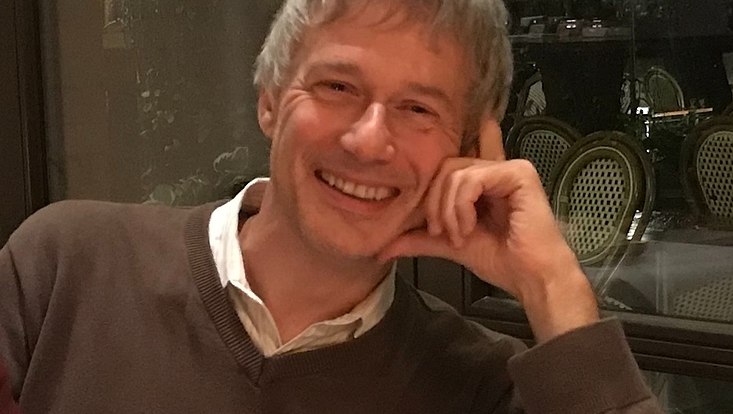Prof. Dr. Eckart Goebel

Curriculum
Eckart Goebel studied Comparative Literature, Philosophy, and German at the Free University of Berlin (Magister 1991) and at St. Hugh’s College, Oxford (MA oxon. 1992). In 1995, he received his PhD in Comparative Literature at the FU for his study on Konstellation und Existenz. Kritik der Geschichte um 1930: Studien zu Heidegger, Benjamin, Jahnn und Musil (Tübingen: Stauffenburg 1996). In 2001, he received his habilitation in Comparative Literature for his book Der engagierte Solitär. Die Gewinnung des Begriffs Einsamkeit aus der Phänomenologie der Liebe im Frühwerk Jean-Paul Sartres (Berlin: Akademie, 2001). From 1995 to 2005, he worked as an Assistant Professor for Eberhard Lämmert at Berlin’s Zentrum für Literaturforschung. In 2005, Goebel was hired as a Professor for German by NYU. He spent the academic year 2013/14 as a Fellow at the Wissenschaftskolleg zu Berlin, Institute for Advanced Study. He accepted a position as Professor for Comparative Literature and German at Tübingen University in 2015, and he has served since 2018 as an Editor for the academic journal German Life & Letters. Besides European and North American literary history, Eckart Goebel’s areas of academic interest include the Goethe Age, the history of ideas, Thomas Mann, anthropology, and psychoanalysis.
Publications (selection)
- Monographs:
- Beyond Discontent. ›Sublimation‹ from Goethe to Lacan, London/New York 2012: Continuum Press.
- Esmeralda. Deutsch-französische Verhältnisse in Thomas Manns ›Doktor Faustus‹, Göttingen 2015: Wallstein.
- Ambition. An Essay on the Burning Desire to Rise. New York 2022: Bloomsbury.
- Edited Volumes:
- with Frauke Berndt: Handbuch Literatur & Psychoanalyse. Berlin/Boston 2017: Walter de Gruyter
- with Cornelia Zumbusch: Balance. Figuren des Äquilibriums in den Kulturwissenschaften. Berlin/Boston 2020: Walter de Gruyter
Research project: Hydraulics and Homoeostasis as Paradigms of Cultural Theory
As part of my work on a theory of balance, I delved into Freud’s writings, and took an especial interest in the origin of the “hydraulic model of the drives”. When Freud writes of the “wells” of the drives, of their flowing, being dammed up, inhibited or obstructed, kept under pressure or released, discharged, and drained, when he writes of “mental balance” – all these metaphors recall water management systems. Consequently, the second generation of psychoanalysts (Jacques Lacan, for instance) integrated the concept of homeostasis, established in 1932 by biologist Walter Cannon, into the psychoanalytic discourse, positing that perfect psychological homeostasis must be continually destabilized by the pressure of desire so that the psyche does not yield to the death drive.
My research project intends to reconstruct these liquid imaginaries of drives and will add another perspective: In 1957, Karl A. Wittfogel published his controversial monumental study on Oriental Despotism. Wittfogel argued that ancient cultures in the ‘Orient’, Asia, and South America were ‘hydraulic cultures’, whose hallmark was the capacity to cultivate arid lands. Large-scale irrigation (rice plantations in Asia; agricultural production along the Euphrates, Tigris, and the Nile; aqueducts, etc.) required centrally organized steady cooperation between many people, enormous logistics, profound knowledge in astronomy, physics, and engineering.
Freud, on his part, supplemented his research on the individual soul again and again with spectacular contributions to cultural theory, for instance in Totem and Taboo or in Moses and Monotheism. My research investigates if the system of hydraulic cultures, well-known long before Wittfogel’s book, had an impact on the development of Freud’s metapsychology, centered around the hydraulic concept of the drives, the water management of the soul or the soul as a waterwork.
Research results: Hydraulics and Homoeostasis as Paradigms of Cultural Theory
The ideal working conditions at Hamburg’s CAS Imaginaria of Force provided the space to rework and to prepare for print a handbook article on Goethe’s dealing with early industrialization and with the revolutionary forces of steam engines.
In addition, I enjoyed the privilege of presenting a draft of a book chapter from my work in progress on Balance & Excess at the Warburg Haus: Under High Pressure. Hydraulics as a Paradigm of Cultural Theory. In this chapter I tried to outline the trajectory leading from Karl Wittfogel’s controversial theory of hydraulic cultures to Sigmund Freud’s hydraulic model of the drives. A seminar as part of an exhibition at Hamburg’s Museum für Kunst und Gewerbe gave an additional opportunity to present and discuss my hypotheses in public.
In my draft I elaborated on some parallels between Freud’s principle of “constancy” and the concept of “homeostasis”, developed by Walter B. Cannon in his famous, highly influential 1932 book on The Wisdom of the Body. Already in Cannon’s, a biologist’s book, the connection between natural and social sciences is established in the epilogue on “relations of biological and social homeostasis”. Since then, numerous attempts have been made to use the concept of homeostasis to elucidate the structure of social and cultural systems. Homeostasis is one of the few terms which from the start provide a link between the natural sciences and the humanities, and have thus inspired numerous cultural theorists from Talcott Parsons, and Marshall McLuhan to Antonio Damasio, just to mention a few. The remaining time of my pleasurable stint in Hamburg I was able to use for extensive reading and the production of necessary excerpts for my next book.
